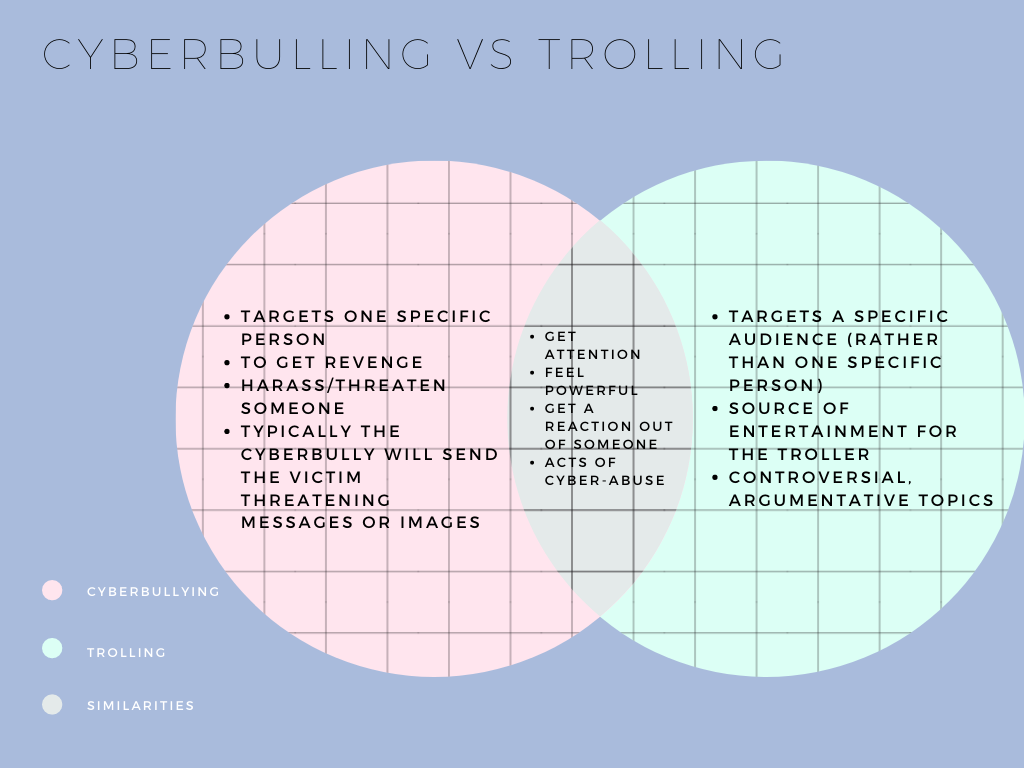The Psychology Behind Trolling
Internet trolling has become a significant problem in our society today. However, often many hear the term “trolling” and confuse it with “cyberbullying” (or they think of the movie Trolls, but that is a different story). For the sake of this project, we are going to define and differentiate the two. As defined by Psychology Today, cyberbullying is the “deliberate and repeated harm inflicted through using the Internet, interactive and digital technologies, or mobile phone.” (Trolling or Cyberbullying? Or Both?). Cyberbullying is intentional, for the bully wants to purposely intimate another specific person using the internet or social media. Trolling, on the other hand, is when “people leave intentionally provocative or offensive messages on the internet in order to get attention, cause trouble or upset someone” (Why do people troll and what can you do about it?). This can be done by posting controversial or off-topic messages in forums or in comments on different posts with the intent of making readers react. Unlike cyberbullying, trolling does not target one specific person. Instead, it aims to get a reaction out of someone they do not know. Being “trolled” is when someone does not recognize a troll, and they respond to someone’s comments or instigations with anger and/or annoyance. Despite the differences between cyberbullying and trolling, it is evident that these are both harmful acts of “cyber-abuse,” aimed with the intention to inflict harm onto another person.

In a study conducted by the Pew Research Center in 2017, approximately “41 percent of Americans have themselves experienced online harassment, and over 60 percent report having been witness to such actions” (Why do people troll and what can you do about it?). People experience trolls and cyberbullies every day on the internet, and it is only a growing issue.
Have you ever been trolled? Answer this survey!
Now, let’s get into the big question: why do internet trolls troll? What is the psychology behind it?
Countless studies have been conducted to find more profound reasons behind the growing internet problem. According to Psychology Today, loneliness can trigger a person’s need for aggression. People who feel alone feel more unhappy or unsatisfied with their lives and are therefore more likely to troll the internet and try to invoke a response from others. Along with this, psychological studies “show trolls tend to be male, show higher levels of psychopathy traits — low levels of empathy, guilt and responsibility for their actions — and higher levels of sadism traits, the enjoyment of causing others physical and psychological pain” (Trolls Understand What Hurts People but They Simply Don’t Care). Trolls feel rewarded by the reactions they get out of people on the internet. In a twisted way, seeing others upset makes them happy. Trolls understand what they are doing and the consequences of their harmful actions, but they still do it for their own enjoyment. With these studies, it is clear that there is a psychological reason why people try to hurt others.
Access to the internet, social media, and public forums only make it easier for these trolls. Other studies on trolling “suggest that trolls thrive in online space because of the lack of face-to-face interaction where they can conduct “mischief behind the keyboard'” (Rogue Cops Among Rogues: Trolls and Trolling in Social Networking Sites). Moreover, a lot of trolls use spam or accounts with false information, so people do not know they are. Being able to hide behind a screen makes it easier for these people to shield their identity and not see the true consequences of their actions.
So what, if anything, can we do about this issue?
If you see a troll (or a cyberbully), you can report it, and you should not respond to their comments/threats. However, how much does that really do? Psychology Today warns readers that approaching people with these psychologically defeating traits “with the intention to offer support and connection is, at best, likely to go nowhere… and more troubling, may lead to harm to the would-be helper and ultimately greater isolation for the person trolling” (What Makes Internet Trolls Tick?). Instead, they simply say that further research is needed in order to find ways to combat these trolls. Tactics such as blocking a specific profile or turning off comments on a specific forum will prevent the troll from attacking a specific person or spamming a certain comment section. Still, it will never truly stop the person from trolling. By these means, it is likely that there will always be an issue with internet trolling.
Works Cited
ABC News. “Trolls Understand What Hurts People but They Simply Don’t Care.” ABC News, ABC News, 13 July 2017, www.abc.net.au/news/2017-07-13/trolls-understand-what- hurts-people-but-they-simply-dont-care/8701424.
Brenner, Grant Hilary. “What Makes Internet Trolls Tick?” Psychology Today, Sussex Publishers, 5 Aug. 2019, www.psychologytoday.com/us/blog/experimentations/201908/what-makes-internet-trolls-tick.
Escartin, Maria Corinna Priscila D. “Rogue Cops Among Rogues: Trolls and Trolling in Social Networking Sites.” Philippine Sociological Review, vol. 63, 2015, pp. 169–190. JSTOR, www.jstor.org/stable/24717164. Accessed 16 Nov. 2020.
“Trolling or Cyberbullying? Or Both?” Psychology Today, Sussex Publishers, 28 Jan. 2014, https://www.psychologytoday.com/us/blog/teen-angst/201401/trolling-or-cyberbullying-or-both.
“Why Do People Troll and What Can You Do about It?” BBC Bitesize, BBC, 5 Nov. 2020, www.bbc.co.uk/bitesize/articles/zfmkrj6.